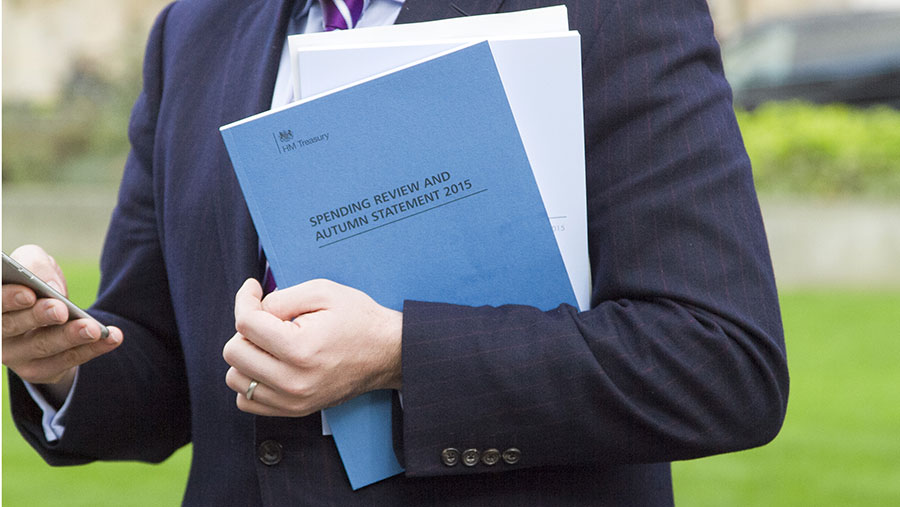Fears for farming after Defra budget cut by 15%
 © Amer Ghazzal/Rex Shutterstock
© Amer Ghazzal/Rex Shutterstock Agriculture is among the losers after a 15% cut to Defra’s budget in the government’s Spending Review and Autumn Statement, say industry leaders.
Defra must make resource savings of 15% by 2019-20 – delivered through efficiencies within the department and across its network.
The Spending Review was unveiled by chancellor George Osborne on Wednesday (25 November).
See also: Defra cuts have ‘massive implications’ for farmers
Although the budget cut is less than many commentators had predicted, some areas of Defra spending are protected, which suggests that the axe will have to fall more heavily elsewhere within the department’s remit if the 15% reduction target is to be met.
Protected expenditure
Protected expenditure includes flood defence funding, such as a £2.3bn capital investment programme to protect more than 300,000 homes.
Also protected is more than £350m of funding for public forests, National Parks and Areas of Outstanding Natural Beauty.
The government said it would be prioritising spending on animal and plant disease prevention, and would invest £130m in capital funding in science by 2020-21.
It will also continue to invest in implementing its 25-year strategy to eradicate bovine TB.
Defra secretary Liz Truss said the settlement meant the department could now press ahead with “vital work” to protect the country from floods and animal and plant disease, protect the natural landscape and deliver on commitments for a cleaner, healthier environment.
Ms Truss said: “Everyone has a part to play in eliminating the deficit by 2020 and, through its ambitious programme of efficiencies, Defra will go further to become a more modern organisation, streamlining services and doing things more strategically.”
Reducing costly bureaucracy and red tape
Defra would reduce its administration budgets by 26% by 2019-20, saving £123m by sharing back office functions such as IT, human resources and finance, with its agencies to reduce unnecessary bureaucracy, and devolving roles to the local front line to ensure effective service delivery.
It would also continue to reduce costly bureaucracy and red tape, securing net savings to business of £470m by the end of the Parliament.
As part of this, a Single Farm Inspection Taskforce will be set up to reduce the number of farm inspections by 20,000 by 2019-20.
The government used the Spending Review to confirm £50m for two new agricultural technology centres, headquartered in York, saying they would support innovation and help the UK grow its share of the £250bn global agritech market.
But industry leaders said many unanswered questions remained, particularly when it came to investment in science and technology.
Pressure on R&D projects
Tight Defra budgets were already putting pressure on research and development (R&D) projects, they warned.
James Clarke, head of soils, crops and water at Adas, said Defra had already announced its intention to give 30 days’ notice of termination or amendment of a number of agricultural and environmental R&D projects across a range of topic areas.
Mr Clarke said: “We accept the government’s right to change its priorities and level of spend on R&D but we would reasonably expect these changes to be made over time in line with the funding cycle rather than arbitrarily and at short notice.
“The rapid cancellation of work has unavoidable consequences such as reduced investment, and an erosion of the agricultural science skill base that is so fundamental to the success of UK agriculture’s ability to contribute to the recovery of the economy.”
Similar concerns were voiced by Crop Protection Association chief executive Nick von Westenholz.
He said: “We are concerned at any cuts that diminish government’s policy capacity across agriculture, and in particular on crop protection issues.”
Policy around plant science and pesticides was a complex and sometimes controversial area that the UK government must ensure was properly resourced, added Mr von Westenholz.
Front-line programmes
It was also vital that budgetary reductions did not impact on front-line programmes.
“Where government funding contributes alongside private investment in supporting crucial environmental schemes, such as the Campaign for the Farmed Environment, any reduction in public funds must be balanced carefully against the need to protect and enhance our environment.
“Elsewhere, there are a number of research projects that have been joint funded by the government and industry and it would be counterproductive to abandon research where significant investment has already been made,” he said.
